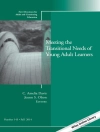This book seeks to advance understandings of and approaches to supporting and sustaining working age adults’ learning across lengthening working lives and inevitable transitions they encounter and are required to negotiate. It is founded on the processes and findings of a three-phase practical inquiry into worklife learning and its implications for workplace and educations’ practice conducted in Australia over a three-year period commencing in 2019. Diverse perspectives and orientations were utilised in approaches to data analysis and renderings from the data, thereby opening up the analysis of these complex phenomena to different lines of interrogation, questions and analytical approaches. It elaborates more fully understandings about the processes of adults’ learning and development across their lifespan of adulthood referred to as working life, and what factors and contributions supported that learning. This book also attempts to reconcile a coherent view about development across the work lifespan, and how that can be supported by education provisions, workplaces, communities, and by the adults themselves.
Inhaltsverzeichnis
Part One: Worklife learning and employability.- Chapter 1. Adults’ worklife learning.- Chapter 2. Policies and practices for sustaining employability through worklife learning.- Part Two: Elaborating and investigating worklife learning.- Chapter 3: The imperatives of and for worklife learning (a review).- Chapter 4. Investigating learning for employability: Method and procedures.- Part Three: Orientation and perspectives of understanding and elaborating worklife learning.- Chapter 5. Employability and work life history.- Chapter 6. Literate practices in worklife histories, transitions and learning – Laurent Filliettaz.- Chapter 7. Learning and development across worklife transitions.- Chapter 8. Indigenous Australian peoples and work: Examining work-life learning histories of Indigenous Australian workers – Debbie Bargallie.- Chapter 9. Learning across working life: a product of ‘personal curriculum.- Chapter 10. Negotiation and work-life transitions.- Chapter 11. Contributions of tertiary education.- Chapter 12. Worklife transitions and learning across working life: An Australian survey.- Part Four: Consolidations and differentiations.- Chapter 13. Consolidations and differentiations.- Chapter 14. Worklife learning: conceptual advances and expanding explanatory bases.
Über den Autor
Dr Stephen Billett is Professor of Adult and Vocational Education at Griffith University, Brisbane, Australia. After a career in clothing manufacturing, he became a vocational educator, teacher educator, professional educator and held a policy role in Queensland. Since 1992, at Griffith University, he has researched learning through and for work and published widely in fields of learning for occupations, vocational education, workplace learning, work, higher education and conceptual accounts of learning for occupational purposes. He has been Fulbright scholar (1999), National Teaching Fellow (2009-11), ARC Future Fellow (2011-16) recipient of honorary doctorates from Jyvaskala University, Finland (2013) and University of Geneva (2020), elected Fellow of the Academy of Social Sciences of Australia (2015), research fellow at Oxford University (2019-22), and adjunct professor at University of Stavanger, Norway (2019-23) and University Vast, Sweden (2019-). His current research projects are on: the standing of vocational education, integration of work experiences to promote university students’ employability, resilience in healthcare workers, worklife learning in an era of change, continuing education and training in Singapore and re-imaging rural general practice after Co Vid19. He is the founding and editor in chief of the journal
Vocations and Learning: Studies in Professional and vocational education, and the
Professional and practice-based learning book series for Springer.
Laurent Filliettaz is a full professor in Adult Education, Language and Work at the Faculty of Psychology and Educational Sciences, University of Geneva, Switzerland. His expertise includes literacy issues in workplace contexts, multimodal interaction analysis in connection to learning and training practices in vocational education and training. He received his Ph.D. in linguistics in 2000 and has conducted numerous research projects over the years in areas such as pragmatics, interactional sociolinguistics or discourse analysis. Laurent is the author of several books and articles published in French and English, analysing the role of language in the workplace and dealing with issues such as cooperation, problem solving, decision making, multiactivity, power, identity and learning. Laurent is currently leading several research programs sponsored by the Swiss national science foundation (SNF) and promoting applied linguistics methods in the field of vocational education and training.
Henning Salling Olesen is Professor at Roskilde University, Denmark. He has had formal posts (pro-rector and rector 1978-81 and 2006-10) in the University, engaged in academic organization. From the early 1980’s, he focused on adult and continuing education research, and developed close relations with trade unions and popular education, and engaged in policy development around adult workers’ rights to education and training, which is still ongoing today. Through organising adult education research, he connected with European networks in this field, including with colleagues at Tampere University, and later, was involved in the European Society for Research in the Education of Adults (ESREA), chairing the organization from 1999-2013. Since 2010, he published a European journal in this field, RELA, and was also involved in founding the Graduate School in Roskilde University in 1997. Apart from a university leadership period a few years ago, he has mainly been involved in doctoral education, including academic collaborations with researchers in China and Brazil.












